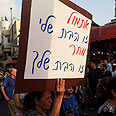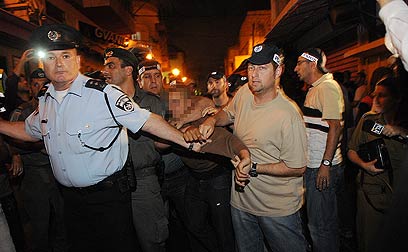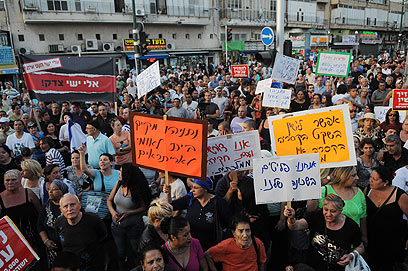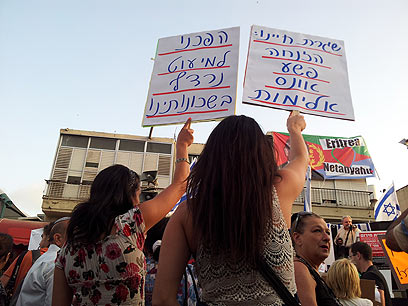
Clashes erupt during south TA protest; migrants attacked
Residents says streets 'no longer safe for children, women' due to influx of African infiltrators. Demonstrators attack migrants' car, leftist. MK Regev: They are a cancer in our society
About 1,000 people gathered in south Tel Aviv's Hatikva neighborhood Wednesday evening to protest against the government's handling of the flow of African migrants into Israel.
Some of the demonstrators shattered the windshield of a vehicle in which three African migrants were riding. The migrants were not injured.
Police arrested two people suspected of attacking a foreign worker during the protest.
Related articles:
- Israel's southern border fence progressing
- 3 Africans suspected of raping 15-year-old girl
- Police chief: Foreigners problem growing
The demonstrators also chased two foreigners but were blocked by police. They also threw two firecrackers at police forces.
Earlier, about 100 demonstrators chased after a leftist who took part in a counter rally. Police officers blocked the protesters path. The rioters hurled glass bottles and sticks at the officers.
According to Israel Police, 17 people were arrested. Fifteen of them were arrested for rioting and assault, while two others were detained for looting a store owned by migrants.
"We stole everything," one of the youngsters who looted the store said with a smile on his face. "People took whatever they could carry."

Demonstrator arrested (Photo: Yaron Brener)
"If the wife of a Knesset member would have been raped, this whole mess would have been sorted out, but no one cares about us" one of the demonstrators who were arrested told Ynet.
The protesters waved signs reading "South Tel Aviv a refugee camp" and "Infiltrators, leave our home."
One of the demonstrators who spoke during the rally urged Prime Minister Benjamin Netanyahu to "decide whether we live in Israel or Sudan."
Smaller protests against the illegal immigration phenomenon were held in Bnei Brak, Ashdod, Ashkelon and Eilat.
Residents of the south Tel Aviv neighborhoods Shapira and Kiryat Shalom held another rally on Chahmei Yisrael Street. They waved signs reading, "Our streets are no longer safe for our children," "The craziness of our life: Neglect, crime, rape and violence," "Yesterday it was my daughter, tomorrow it will be your daughter," and "Yishai was right."

Many Israelis, including ministers, attribute the growing violence in the country to the illegal immigration of Africans.
"We are afraid to walk the streets," said Ayala Silwani, who has lived in Shapira for the past 30 years. "The elderly are forced to remain indoors, women are afraid to walk around alone – this is an impossible situation."

The protest organizers urged participants not to take the law into their own hands and refrain from carrying out acts of violence in the neighborhood.
"The infiltrators are taking over our neighborhood," another resident said. "Netanyahu must find an immediate solution. The prime minister must see to it that (the infiltrators) are provided with food, but first he must guarantee our security."
A number of Knesset members from the ruling Likud party were also on hand. MK Danny Danon, chairman of the Knesset lobby dealing with the problem of infiltrators, called on the government to deport the foreign migrants. "We should not be ashamed of the word 'expulsion'. We can send them back (to their home countries)," he said.
"I spoke with the president of Sudan, and he said to me 'no problem, send them back to us.'"
MK Miri Regev referred to the infiltrators as a "cancer" and attacked the human rights groups that are aiding the foreign migrants.
"The infiltrators are a cancer in our society. All the leftists who filed High Court appeals (against the deportation of African migrants) should be ashamed of themselves," she said.
"We will not let them thwart our attempt to protect ourselves, our children, our women and our work places. We will continue to protest every day until the last of the Sudanese infiltrators returns to his country."
Earlier Wednesday, Interior Minister Eli Yishai said the construction of a fence along the border with Egypt would not stop the influx of foreigners into Israel. "The fence has been breached in the past and it will be breached many more times in the future," he said during a Knesset session.
The minister said that if given the mandate, there will not be a single infiltrator left in Israel in one year's time. "I would change the law so that every infiltrator is put in jail. Then he can decide whether he wants to remain imprisoned or go back to his home country," he said.
The tensions between Israelis and foreign migrants peaked in late April when a Molotov cocktail was lobbed into Sudanese kindergarten in south Tel Aviv.
Tel Aviv District Police Commander Aharon Aksol said Monday that the past few months have seen a surge in violent crimes committed by illegal immigrants, but added that the phenomenon should not be attributed only to the infiltrators who reside in the city's southern area, but to "Israeli society as a whole."
During a Knesset debate on the wave of violence, Aksol said the growing tension between the residents of south Tel Aviv and the infiltrators was dangerous. He claimed that something must be done to curb the violence "or else the situation may deteriorate."
- Follow Ynetnews on Facebook and Twitter
- Receive Ynetnews updates directly to your desktop











